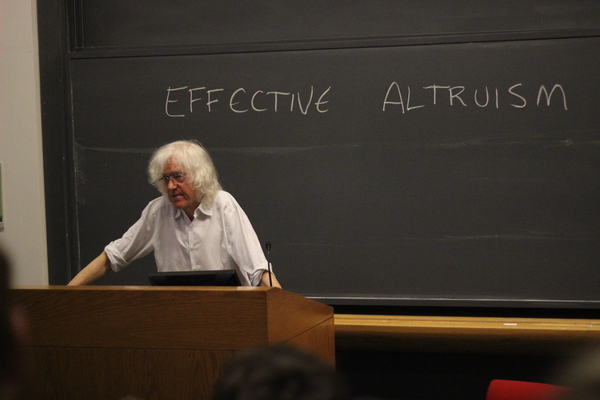There is no shortage of advice online about how to be happier. A quick bit of Googling will send you to “ultimate guides” to happiness that will advise you to spend more time with friends, reduce your stress, and eat almonds. Or you might come across articles that claim to be based on the work of behavioral scientists, who challenge us to “conquer negative thinking,” tell us to control our breathing, spend more time in nature, and fold our clothes neatly. Happiness is also sometimes treated like a health issue, with accompanying prescriptions of gratitude practice, exercising more, and ditching our phones for time in nature. There is a cornucopia of tips, tricks, and strategies that are guaranteed to turn frowns upside-down, many of which claim to be supported by cutting-edge science.
A lot of happiness advice online can seem like common sense. Get plenty of sleep, hang out with friends, and make sure you eat well? These seem like no-brainers. Other advice you’ll likely come across can seem much more idiosyncratic, and with less evidence to back it up. Some happiness advisors will tell you that forcing the physical act of smiling will make you happier, although the evidence that this will have any long-lasting effects is mixed at best. Others will make oddly specific recommendations to eat foods like bananas, yogurt, and cottage cheese to boost your mood, although their connections to increased happiness appear inconclusive (and tough luck if you’re lactose intolerant). Some will even tell you that all you need to do is “choose happiness,” which by itself feels about as useful as the advice to just “stop being sad.”
It likely doesn’t come as a surprise that the happiness-improving advice out there varies in quality. What is perhaps more surprising is that recent research suggests that many of the most popular and purportedly science-backed strategies to being happier – including practicing gratitude, mindfulness, exercise, social interaction, and time spent in nature – are either only weakly supported by high-quality experiments, have very limited effects, or lack any evidence for their effectiveness at all. Overall, the current state of happiness research looks bleak.
Of course, the research is not yet fully decided, and an important caveat is that the studies analyzed didn’t deal with clinical populations. In other words, the aforementioned strategies may still be effective when it comes to those who have been diagnosed with physical or mental health disorders.
It is reasonable to expect that a significant number of people who are seeking out happiness strategies online, however, are not part of a clinical population. There thus seem to be ethical concerns around giving out advice that claims to be empirically supported when it isn’t, especially when said advice promises to make one happier. At the same time, even if it does lack the endorsement of peer-reviewed science, a lot of this advice seems unlikely to cause much harm, and it at least has the potential to increase someone’s momentary happiness, even if it hasn’t been shown to be effective in general.
In light of the concerns raised by recent research, what are the obligations of the happiness-mongers, and what should we as happiness-seekers do?
The authors of the aforementioned study themselves raise several potential concerns with continuing to provide happiness advice that isn’t well-supported by evidence. First, given the ubiquity of the most common happiness strategies, researchers must make sure that they’re actually effective. This is not only because of professional obligations, but in order to prevent happiness strategies from becoming a kind of snake oil. After all, while it’s easy enough to find free guides to increasing your happiness online, there are also plenty of books, programs, and courses that are being offered for a fee. If these products feature any of the strategies examined by the researchers and are predicated on having robust scientific evidence supporting them, then people are being misled.
Consider, for example, a critique of mindfulness, one of the most popular approaches to well-being. While many have benefitted from employing mindfulness techniques, many of the benefits that mindfulness may offer only come as the result of dedicated time and practice, something that is typically not emphasized in the bite-sized mindfulness tidbits that are so readily accessible online. Entire industries have also sprung up around the idea of mindfulness as a panacea, resulting in what some refer to as McMindfulness.
The lack of empirical support for happiness strategies combined with their presentation in ways that prioritize quick fixes leads us to another of the researcher’s concerns: when these strategies don’t work, they can lead to discouragement. After all, if you’re told that top researchers and scientists have figured out how you can be happier if you just follow their advice, then when strategies don’t work you risk being even less happy than when you started. Rather than being benign, happiness advice could result in an overall decrease in well-being.
There are other reasons in the vicinity to be concerned about happiness advice. For instance, some who have expressed reservations about mindfulness are worried that conceiving of happiness as a project that is solely meant to be addressed internally risks ignoring broader structural and social factors that contribute to the conditions that made one unhappy in the first place. Philosophers are also likely to push back against the conception of happiness that is prototypical in positive psychology, namely one of “subjective well-being” that is defined by the presence of good feelings and the level of satisfaction with one’s life. For instance, it has been argued that this conception of happiness leaves out whether one has led a morally good life, something that appears to have a significant impact on people’s evaluations of whether one truly is happy.
Of course, no one is saying that you should give up your beloved nature walks just because meta-analyses don’t find them to improve long-term subjective well-being in aggregate nonclinical populations. We should, however, be aware that happiness is a more complex project than it’s often made out to be, and that while common happiness strategies may be worth a shot, if they don’t seem to work for you then you’re not alone.






